Technology
9 minute read
WebFlow Vs. WordPress: What Key Differences Are There Between Platforms?.
LAST UPDATED:
June 22, 2023
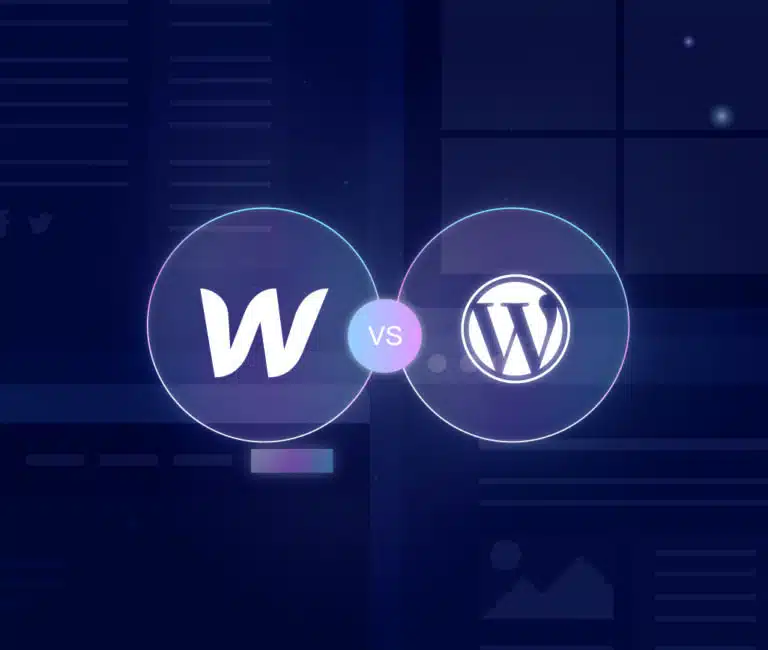

Two of the best and most popular platforms for helping you build a fantastic website are WebFlow and WordPress.
These two well-known platforms work similarly, however, there are several key differences.
To help you decide which website builder platform is best for your website, this article compares WebFlow vs WordPress and highlights their main differences.
WebFlow
WebFlow is a no-code web design application that allows users to create and design their own websites. It was founded in 2013 and is powered by Amazon Cloudfront.
Based on data from the Expanded Ramblings, there were 3.5 million users as of February 2022.
WordPress
WordPress is an open-source content management system (CMS). It was made available to the public earlier than WebFlow and was founded in 2003.
An interesting fact about WordPress is that they give their new code releases names based on well-known jazz musicians.
Examples include Arturo O’Farrill, which was released most recently in 2022, and Miles Davis, WordPress’ first official code release in 2004.
WordPress started as a blogging platform before turning into the CMS known today.
According to the online resource EarthWeb, WordPress has 455 million users as of 2022.
To put it another way, 39.5% of all websites on the Internet are utilizing WordPress.

By making WordPress open source, it has allowed for an exhaustive list of plugins, themes, and resources to be created on its behalf. What once was a meager blogging portal has become a comprehensive website building machine.
Caleb Shultz, Director of Projects
Subscription Costs
WebFlow Site Plans
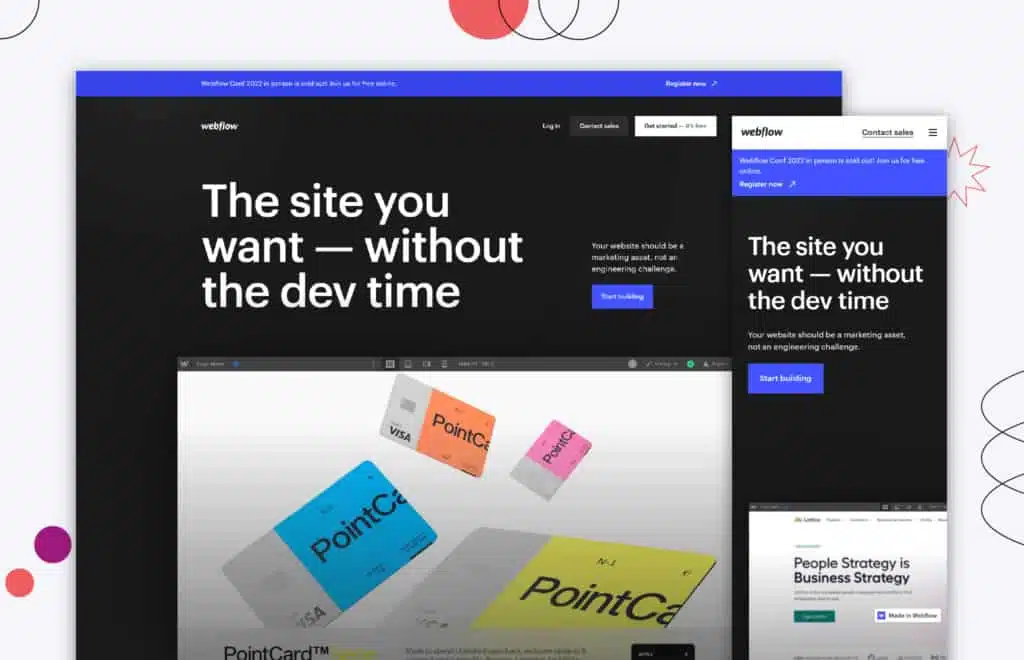
WebFlow offers different packages for different needs that can be billed monthly or yearly.
Starter
A simple website design that can be published in webflow.io
- Free
- Webflow.io domain
- 50 CMS items
- 1GB bandwidth
Basic
Obtain the essentials to start a basic website
- $12 per month
- Custom domain
- 0 CMS items
- 50GB bandwidth
CMS
Allows you to launch a blog or content-driven website
- $16 per month
- Custom domain
- 200GB bandwidth
- 3 guest editors
Business
Build a high-traffic marketing website
- $36 per month
- Custom domain
- 10,000 CMS items
- 400GB bandwidth
- 10 guest editors
WebFlow Plans for Ecommerce websites:
Standard
Excellent for new start-up businesses
- $29 per month
- 500 items
- 2% transaction fee
- $50K annual sales volume
- All CMS plan features
Plus
Ideal for business websites with higher volume
- $74 per month
- 1,000 items
- 0% transaction fee
- $200K annual sales volume
- All Business plan features
Advanced
Optimal for expanding an online business
- $212 per month
- 3,000 items
- 0% transaction fee
- Unlimited annual sales volume
- All Business plan features
WordPress Plans
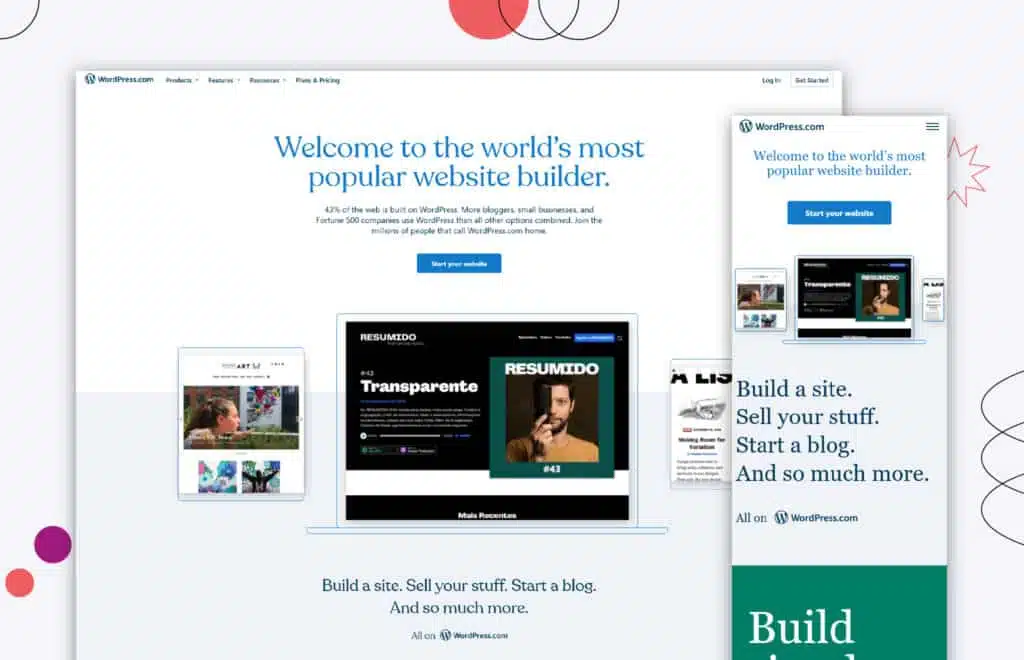
WordPress is also available with varying rates for various packages and can be billed either yearly or monthly.
Personal
- $2.95 per month
- Free domain for one year
- Best-in-class hosting
- Remove WordPress.com ads
- Collect payments
- Unlimited email support
Premium
- $5.99 per month
- Free domain for one year
- Best-in-class hosting
- Remove WordPress.com ads
- Collect payments
- Unlimited email support
- Live chat support
- Earn ad revenue
- Premium themes
- Upload videos
- Google analytics integration
Business
- $16.78 per month
- Free domain for one year
- Best-in-class hosting
- Remove WordPress.com ads
- Collect payments
- Unlimited email support
- Live chat support
- Earn ad revenue
- Premium themes
- Upload videos
- Google analytics integration
- Install plugins and extend functionality for your site with access to more than 50,000 WordPress plugins
- Advanced SEO (Search Engine Optimization) tools
- Automated site backups and one-click restore
- SFTP (SSH File Transfer Protocol) and database access
Ecommerce
- $49.45
- Free domain for one year
- Best-in-class hosting
- Remove WordPress.com ads
- Collect payments
- Unlimited email support
- Live chat support
- Earn ad revenue
- Premium themes
- Upload videos
- Google analytics integration
- Install plugins and extend functionality for your site with access to more than 50,000 WordPress plugins
- Advanced SEO (Search Engine Optimization) tools
- Automated site backups and one-click restore
- SFTP (SSH File Transfer Protocol) and database access
- Accept payments in 60+ countries
- Integrations with top shipping carriers
- Premium design options for online stores
Winner: WordPress!
Given that the majority of their costs come from future add-on purchases, WordPress is the less expensive alternative in terms of up-front fees.
Theme Design & Customization
WebFlow vs WordPress Theme Designs & Customization
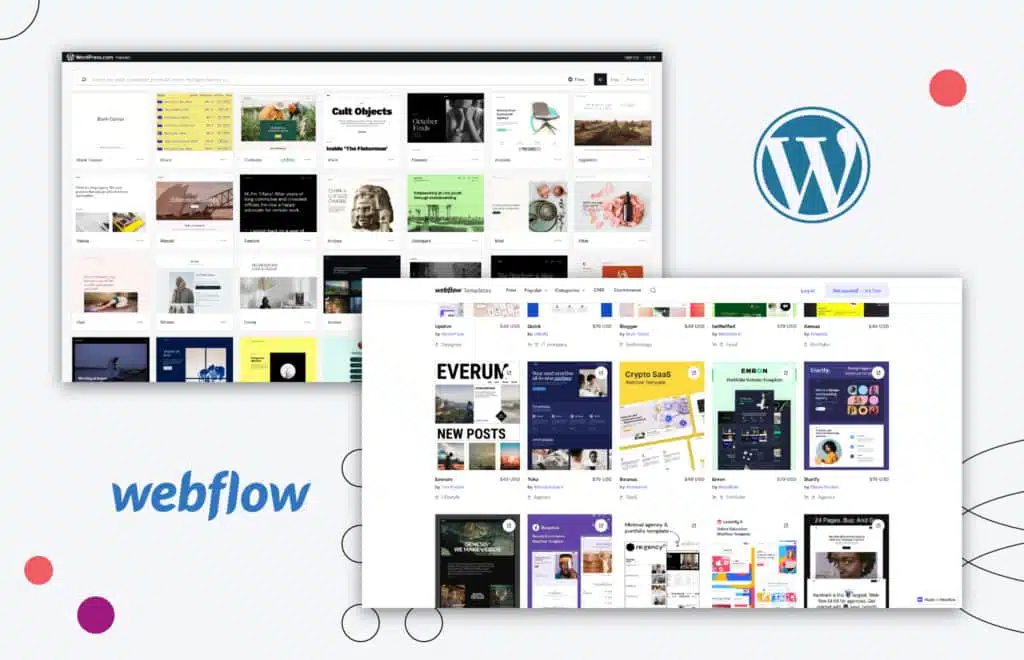
WebFlow
With more than a dozen different field types, WebFlow provides you the flexibility to define your content and design the way you see fit.
WebFlow themes originate from both WebFlow’s designers and developers as well as from outside designers and developers who have a strong understanding of the fundamentals of visual design, such as contrast, typography, layout, balance, hierarchies, and proportions.
WordPress
You may use WordPress to create themes and designs that precisely match the objectives, vision, and content of your business.
WordPress creates themes, especially by exceptional designers.
Additionally, you’ll have someone to contact if you need assistance.
Winner: Both!
Both! Designers can share their originality on both platforms and produce themes for WordPress and WebFlow templates.
What Types of Options Do You Have in Each?
WebFlow
WebFlow has a variety of price points to suit your needs.
On your website, there are numerous additional areas with themes and layouts. You can use the various sub-topics to pick the template that best fits the requirements of your website.
In addition, WebFlow allows developers and designers to market their creations.
WordPress
WordPress offers both free trial options and paid alternatives with fantastic opportunities to create beautiful websites. You can quickly search their themes page for particular website features.
Winner: Both!
Both platforms include a large number of themes and templates that can be used by anyone and are very simple to customize.
How Easy Is It To Edit These Websites?
WebFlow
Themes and templates for WebFlow are customizable, so after purchasing one, you can change it to suit your needs.
WordPress
WordPress Themes allows you to have a customizable, dynamic website using branded colors, fonts, etc., based on your demands.
Based on the colors, fonts, photos, and other design elements you choose to utilize, you can customize the themes to suit your tastes.
Winner: Both!
Both platforms provide theme and template customization, allowing users to adapt them to their specific needs.
Plugins and Integrations
What Does Each Ecosystem Look Like?
WebFlow
WebFlow disapproves of plugins.
Instead of requiring you to purchase additional plugins, they include everything you require in their packages.
WordPress
WordPress provides a variety of plugins to suit the demands of its users. These plugins include paid for and free plugins, including their notable SEO plugin Yoast SEO plugin.
Plugins are developed and designed by their teams.
Designers and developers can also produce plugins outside of WordPress.
Winner: WebFlow!
WebFlow: By allowing users to use their preferred applications without having to buy plugins for each one, WebFlow allows you to save money. Instead of charging extra fees, they incorporate plugins as part of their package costs.
What Type of Quality Control Do These Marketplaces Offer?
WebFlow
WebFlow does not use plugins, hence they are not required to have quality control in their market.
WordPress
WordPress provides the opportunity for third-party designers and developers to make plugins for WordPress websites.
Featured plugins include:
- Classic Editor
- Akismet Spam Protection
- Jetpack
- Classic Widgets
- And more
Winner: WordPress!
WordPress prevails by default since they have external designers and developers who create plugins; therefore, they do need to have a quality control procedure in place.
What SEO Functionality Does Each Platform Offer by Default?

WebFlow
SEO on WebFlow does not require any plugins. They cover everything in their packages to increase the SEO of your website.
WebFlow allows you to deploy any changes live without depending on engineers, giving you fine-grained control over SEO markup, indexing rules, redirects, and more.
WordPress
WordPress is renowned for having the best SEO plugins.
The WordPress plugin that is most frequently used and does an excellent job is Yoast SEO.
Yoast SEO is jam-packed with tools to help users and search engines make the most of your website.
Winner: Both!
Both platforms present excellent chances for your website to rank for SEO. WebFlow more or less leaves SEO up to you and the work and effort you put into it. WordPress plugins do the same but offer recommendations on how well your content, meta description, etc. will rank for SEO.
WebFlow vs WordPress Security
How Is Security Managed in Each Platform?
WebFlow
WebFlow maintains its platform’s security by adhering to industry standards.
- Two-step verification
- No cost SSL certificate
- Information security program
- Internal security measures
- WebFlow’s application security
WordPress
To guarantee the safety of the websites hosted on their platform, WordPress updates its platform frequently.
To enhance security features, they automatically update the websites they support in the background.
The WordPress Security Team strives to find and fix common WordPress security issues and concerns in the core software that is available for distribution and installation with the support of the WordPress worldwide community and the WordPress core leadership team.
Winner: Both!
Both platforms recognize their duty to maintain the safety and security of the websites they host.
Maintenance Costs/Long-Term Support
How Frequently Do We Need To Worry About Updates?
WebFlow
Depending on when things need to be updated, WebFlow delivers updates to their platform and makes announcements about new upgrades on their website.
WordPress
WordPress often releases new platform updates with jazz musician-themed names.
Checking for updates on plugins is necessary because they’ll need to be updated to assist with website maintenance.
Winner: Both!
Both platforms are winners in our eyes because they update frequently and promptly inform users. Both of them are worried about the security of their platform, which necessitates regular updates.
Do the Platforms Themselves Offer Support?
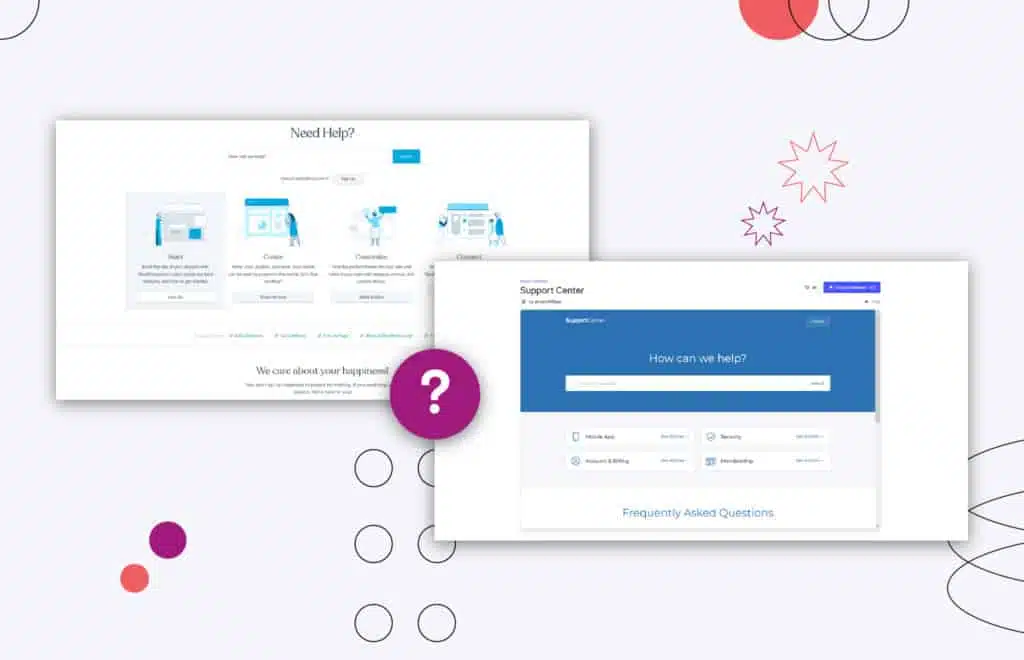
WebFlow
WebFlow features a blog with useful information, a FAQs page, and WebFlow University Resources, a portal with tools to help with problem-solving.
They also feature a forum where clients may ask questions and receive answers from other users.
In addition, you can also email WebFlow with questions.
WordPress
Links to customer FAQs are available on the WordPress help page and feature a forum with accurate information.
You can also contact WordPress via email for any questions.
Winner: Both!
Both platforms provide comprehensive customer support, whether it be through already published articles or support forums where other users can also answer queries and assist.
How Many Developers Are There Out There That Know How to Work on Each Platform?
WebFlow
WebFlow developers are in high demand due to their knowledge of the platform and coding.
There are also several talented WebFlow developers from freelance websites such as Upwork or Fiverr.
WordPress
Due to the specialized nature of their talents, WordPress developers are in high demand.
There are over 8,300 WordPress developers, who may also be found working for reputable web design firms and freelance websites.
Winner: Both!
Both platforms have talented developers you can rely upon. We need more developers with a constantly expanding online presence, therefore by promoting creators on both platforms, we support both as winners.

No Plugins Needed
WebFlow provides everything to users for their use. Plugins are not required to achieve the desired design and development outcomes.
Visual Editor
WebFlow allows designers to easily make adjustments and see their designs in real-time.
This is advantageous since WebFlow is written in HTML and CSS, where you can immediately watch the code come to life.
Out-of-the-Box Optimization
WebFlow enables you to have an optimized website right out of the box, unlike WordPress, which requires you to work to precisely optimize your website.
Huemor’s Overall Take
Much more sophisticated than systems like Squarespace or Weebly, WebFlow is a superb low-to-no code website tool.
WebFlow is a fantastic option if you’re searching for a trendy portfolio website or are just starting your business.

Less Learning Curve
WordPress makes it simple for users to edit and update their websites.
It doesn’t deal with HTML or CSS like WebFlow does, making it simpler for users who are unfamiliar with those languages to make modifications.
Lots and Lots of Resources
WordPress is a well-known platform with over 400 million users. There are numerous online tools, guides, and tutorials available.
Many programmers and developers are knowledgeable about WordPress and can assist your website.
Third-Party Integrations
WordPress Performance Optimization and plugins can enhance WordPress websites.
With those plugins, there are many alternatives available, and you can readily implement third-party integrations.
Huemor’s Overall Take
WordPress has gotten a bad rap for being bloated, slow, and difficult to manage.
However, that has a lot more to do with the craftsman (developer) than the tool (WordPress).
A well-built WordPress website can meet and exceed the needs of any growing business. It’s a great solution for mid-sized businesses with some, but limited in-house technical expertise.
Both platforms are effective, especially when used properly.
To build the website of your dreams, it all depends on what your website needs to accomplish and how you use the capabilities both platforms provide.
Want to discuss concepts with web design professionals?
Contact us today and learn more about how we can assist you in creating a website that will help you achieve greater success.
Get Memorable Insights.
Sign up to receive actionable web design advice directly in your inbox monthly.
Get Memorable Insights.
Sign up to receive actionable web design advice directly in your inbox monthly.
Author
Jeff Gapinski is the President of Huemor where he helps plan the long-term strategic growth of the agency. Jeff is passionate about UI/UX, demand generation, and digital strategy.
What Do You Think?
Have feedback? Maybe some questions? Whatever it is, we'd love to hear from you.




![Website Design Standards We Follow [That You Should Too!]](https://huemordev.b-cdn.net/wp-content/uploads/2021/12/2023.04.04.Website-Design-Standards-We-Follow-That-You-Should-Too.jpg.webp)



No comments found